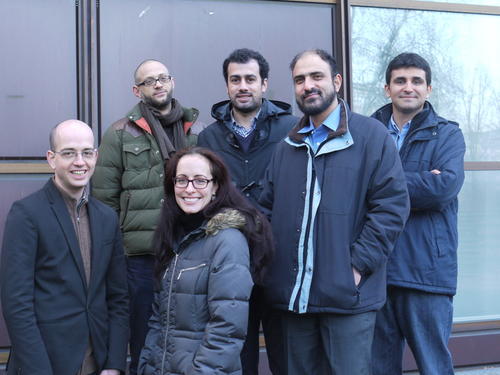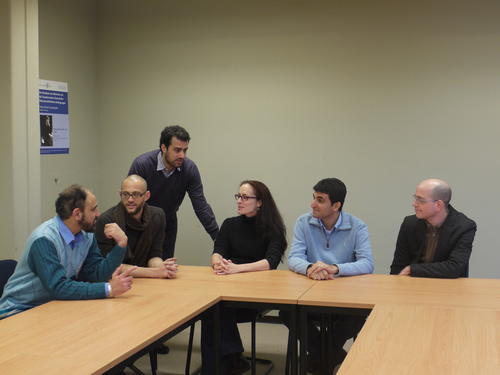Associated Fellows 2012/13
Ya’ar Hever: The Discourse of the ‚Semitic‘: Language, Nation and Race
Ya’ar Hever received his BA (2005), MA (2007) and PhD (2012) in Linguistics from the Hebrew University of Jerusalem. He studied structural linguistics and all branches of the Semitic languages, focusing on the Ethiopian Semitic languages. His MA thesis and PhD dissertation analyze various aspects of the syntax of Chaha, an Ethiopian Semitic language that belongs to the Gurage language cluster, using as a corpus the first texts printed in this language (dating from 1933 onward), which include translations of Christian texts as well as original literary works (most notably by Gäbrä-Iyäsus Hailä-Mariam).
As a fellow of Zukunftsphilologie in Berlin, he pursued a metadiscursive analysis and evaluation of the philological construct of the “Semitic” and the “Semite” from its origin in linguistics, as it is used for the classification of languages into families, to its development in other fields of knowledge as a politically loaded term. The linguistic debate over the Semitic character of Modern Hebrew served as a case study of the elusive and intricate meaning of this term in philological practice and outside of it.
Murat Umut Inan: Editing, Glossing and Translating Hafez of Shiraz in the Ottoman Empire: Issues of Textual Criticism and Interpretation in the 16th Century Ottoman Commentaries on Hafez’s Divan
Murat Umut Inan holds a BA in Turkish Language and Literature, an MA in Ottoman Language and Literature, both from Boğaziçi University (Istanbul), and a PhD in Near and Middle Eastern Studies from the University of Washington. His dissertation focuses on a late sixteenth-century Ottoman commentary written on the Divan of Hafiz of Shiraz by Ahmed Sudi and discusses the ways Sudi’s philological commentary departs from the preceding mystical commentaries in terms of textual analysis and interpretation. In Berlin, Inan undertook a postdoctoral research project that elaborates on his dissertation work. The project involves the study and interpretation of Hafez’s Divan in the Ottoman Empire. It explores, on the one hand, the ways Hafez’s Persian text was edited, glossed, and translated by Ottoman scholars coming from different backgrounds and, on the other, the contexts in which the text was read and interpreted by Ottoman readers across the Empire. Inan’s research interests focus on Ottoman and Persian literatures and cultures and on intertextual and intercultural relations in the early modern literary world. The critical issues that inform his current work are literary reception and appropriation, intertextuality, and the politics of textual interpretation.
Elizabeth Eva Johnston: The 19th Century ‚Wissenschaft des Judentums‘ and the Future of Philology
Elizabeth Eva Johnston received her BA in Religious Studies from Pomona College and her PhD in Middle Eastern, South Asian, and African Studies from Columbia University in 2012. Her dissertation surveys literature on the German Wissenschaft des Judentums (Science of Judaism) and the Arab Nahda, two nineteenth-century “movements” identified with the onset of “modernity” among German Jews and among Arabs in Greater Syria and Egypt, respectively. Her work presents new readings of founding texts associated with both and focuses on their presentation and utilization of “science” and “sciences”, exposing and exploring contestations and variations regarding these concepts within and beyond Europe’s geographic bounds. As a Zukunftsphilologie Fellow, she expanded upon her research on the Wissenschaft des Judentums, tracing the emergence of this new philological enterprise in the first half of the nineteenth century and its subsequent transformations into localized and particularized projects through the second half. Too often the diversity of the Wissenschaft des Judentums is obscured or minimized by a singular narrative of its development, which presents it as the forebear if not equivalent to Modern Jewish Studies. Johnston’s research aims to recoup this diversity and explore the meanings and significance to its divergent and discordant forms.
Mudasir Mufti: Revisiting Kashmir’s Hagiography: Rishis, Sufis and Syncretism
Mudasir Mufti is a Senior Assistant Professor in the Department of English, University of Kashmir, Srinagar, where he completed his Masters in 2002 and PhD in 2009. For his doctorate he worked on two British dramatists, Harold Pinter and Tom Stoppard, from a postmodernist perspective, looking into the problems of language, power, subjectivity, memory and history as reflected in the works of these playwrights. Mufti’s interests include literary theory, translation, religious studies and Classical Persian and Arabic literatures. Mufti has translated Mullah Tahir Ghani (d. 1669), the foremost Persian poet of Kashmir, for Penguin, India, which will be published in January 2013.
As a Fellow of Zukunftsphilologie, he worked on some important hagiographical texts of Kashmir written from 16th to 19th centuries. Mufti focussed on the biographies of Sufis and Rishis of Kashmir to reassess their role in the creation and consolidation of a new religious order. He tried to see how these texts can be read as instances of self-representation aiming to construct and control the identities, beliefs and desires of an emerging social order and will also re-examine the historical validity of such ideas as pluralism and syncretism in the context of Kashmir.
Ronny Vollandt: Ancient Jewish Historiography in Arabic Garb: Sefer Yossippon among Jews, Christians and Muslims
Following his undergraduate studies in Berlin, Vollandt received an MA in Arabic from the Hebrew University of Jerusalem, where he wrote a thesis under the direction of Prof. Simon Hopkins on “The Transmission of the Judeao-Arabic Pentateuch Translation of Rav Saadiah Gaon” (soon to be published by E. J. Brill). He went on to take his PhD from the University of Cambridge under the supervision of Prof. Geoffrey Khan, with a thesis on “Christian-Arabic translations of the Pentateuch from the 9th—13th centuries.” While at Cambridge, he taught Biblical Hebrew and worked at the Taylor-Schechter Genizah Research Unit in the University Library. Vollandt was a Post-Doctoral Fellow at Oxford Centre of Hebrew and Jewish Studies in 2011 and at the CNRS Institut de Recherche et d'Histoire des Textes in Paris in 2011—2012.
He is the author of several articles, all focused on the various aspects of the translation, transmission and study of the Bible in Arabic, and the
forthcoming book The Torah in the language of the Ishmaelites. Saadiah's Tafsir between Jews, Christians, and Muslims.
As a Zukunftsphilologie Fellow in Berlin, he worked on the Arabic translation of Sefer Josippon.







